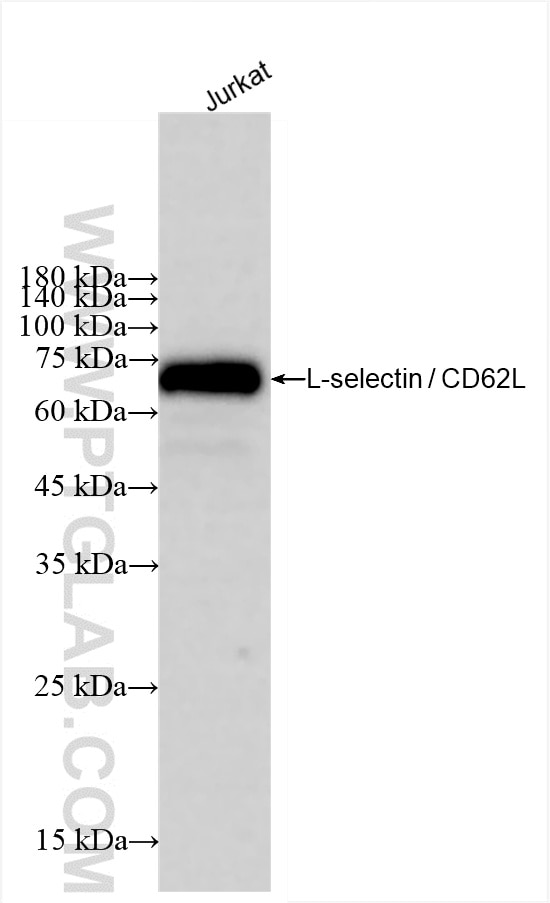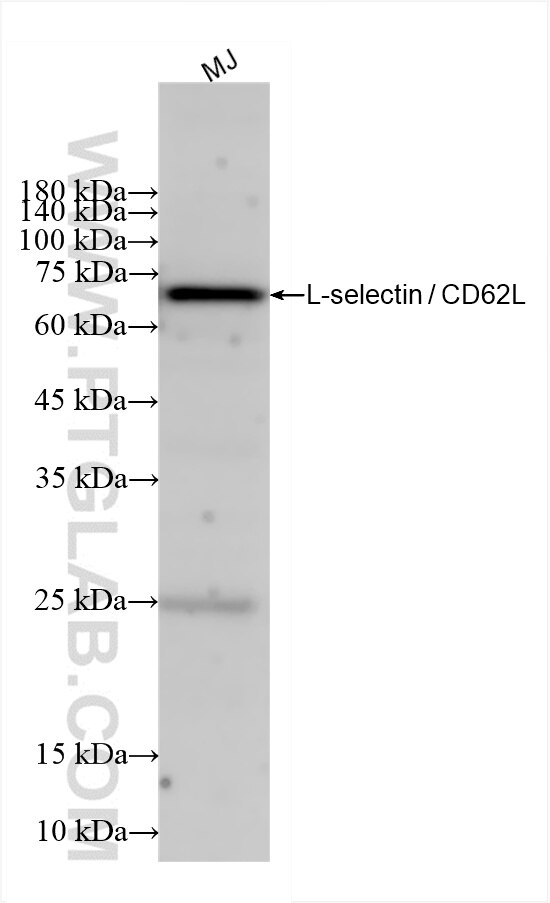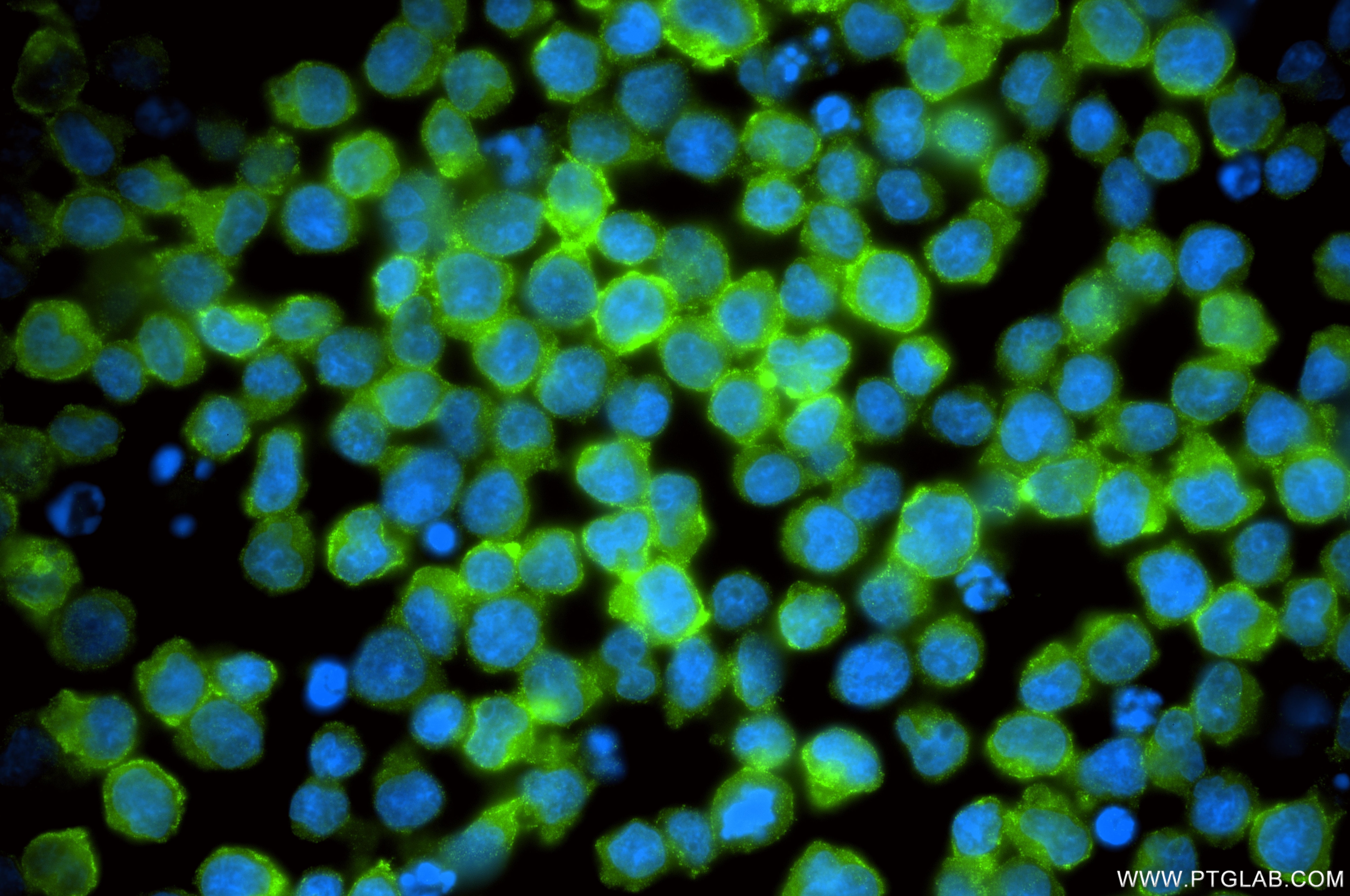Tested Applications
| Positive WB detected in | Jurkat cells, MJ cells |
| Positive IF/ICC detected in | Jurkat cells |
Recommended dilution
| Application | Dilution |
|---|---|
| Western Blot (WB) | WB : 1:500-1:2000 |
| Immunofluorescence (IF)/ICC | IF/ICC : 1:50-1:500 |
| It is recommended that this reagent should be titrated in each testing system to obtain optimal results. | |
| Sample-dependent, Check data in validation data gallery. | |
Product Information
85111-6-RR targets CD62L in WB, IF/ICC, ELISA applications and shows reactivity with human samples.
| Tested Reactivity | human |
| Host / Isotype | Rabbit / IgG |
| Class | Recombinant |
| Type | Antibody |
| Immunogen |
CatNo: Eg3006 Product name: Recombinant Human L-selectin/CD62L protein (rFc Tag) Source: mammalian cells-derived, V37 Tag: C-rFc Domain: 39-332 aa of NM_000655.5 Sequence: WTYHYSEKPMNWQRARRFCRDNYTDLVAIQNKAEIEYLEKTLPFSRSYYWIGIRKIGGIWTWVGTNKSLTEEAENWGDGEPNNKKNKEDCVEIYIKRNKDAGKWNDDACHKLKAALCYTASCQPWSCSGHGECVEIINNYTCNCDVGYYGPQCQFVIQCEPLEAPELGTMDCTHPLGNFSFSSQCAFSCSEGTNLTGIEETTCGPFGNWSSPEPTCQVIQCEPLSAPDLGIMNCSHPLASFSFTSACTFICSEGTELIGKKKTICESSGIWSNPSPICQKLDKSFSMIKEGDYN Predict reactive species |
| Full Name | selectin L |
| Calculated Molecular Weight | 42 kDa |
| Observed Molecular Weight | 65 kDa |
| GenBank Accession Number | NM_000655.5 |
| Gene Symbol | CD62L |
| Gene ID (NCBI) | 6402 |
| ENSEMBL Gene ID | ENSG00000188404 |
| Conjugate | Unconjugated |
| Form | Liquid |
| Purification Method | Protein A purification |
| UNIPROT ID | P14151-1 |
| Storage Buffer | PBS with 0.02% sodium azide and 50% glycerol, pH 7.3. |
| Storage Conditions | Store at -20°C. Stable for one year after shipment. Aliquoting is unnecessary for -20oC storage. 20ul sizes contain 0.1% BSA. |
Background Information
CD62L, also known as L-selectin or SELL, is a member of the selectin family of adhesion molecules that also include CD62E (E-selectin) and CD62P (P-selectin) (PMID: 2663882, 2473156, 1382078). CD62L is a highly glycosylated protein expressed on the surface of most leukocytes, including lymphocytes, neutrophils, monocytes, eosinophils, hematopoietic progenitor cells, and immature thymocytes (PMID: 1694883, 1688580). It mediates the binding of lymphocytes to high endothelial venules (HEV) of peripheral lymph nodes through interactions with a constitutively expressed ligand, and is also involved in lymphocyte, neutrophil, and monocyte attachment to endothelium at sites of inflammation (PMID: 1382078).
Protocols
| Product Specific Protocols | |
|---|---|
| IF protocol for CD62L antibody 85111-6-RR | Download protocol |
| WB protocol for CD62L antibody 85111-6-RR | Download protocol |
| Standard Protocols | |
|---|---|
| Click here to view our Standard Protocols |








